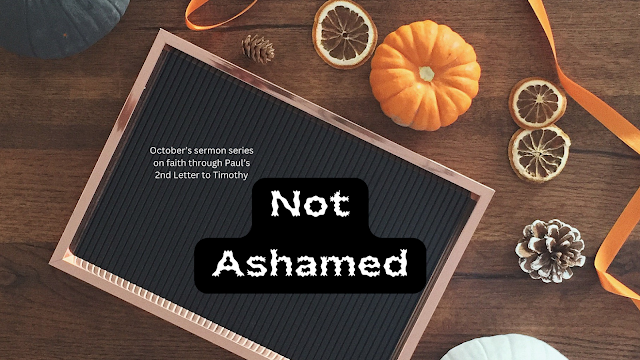Poured Out - 2 Timothy 4:6-8, 16-18 (Pentecost 20C)
Last week, I talked about how our itchy ears can get in the way of the truth of salvation and how we can be distracted in our pursuit of holiness. Paul still encourages Timothy & even us now to “carry out your ministry fully”, in verse 5. But at the start of our excerpt today, the mood has changed. Paul seems weak and very convinced that death is coming soon.
This part of the letter has become amazingly personal, almost like it’s a little awkward for us to be reading it. Should we close the door to the hospital room that they’re conversing in, to give them a bit of privacy?
Although, we’d miss the lesson Paul has for us. He is continuing where he left off last week to his final words for Timothy. As we’ve gone through this letter, we’ve talked about rekindling the gift God has presented to us, showing up in service for God, staying encouraged and faithful when it’s difficult. But now, at least for Paul, it’s the end of the journey and we are the benefactors of the wisdom he’s gained since all those days ago when he walked the road and saw Jesus.
The first line is not something you expect to find in the Bible, talking about libations. Isn’t that something we’d see on the menu once we get to lunch in after the service? But no… the Greek word is <stendomai> and sometimes it means to be put to death, to pour out one’s blood. It has the force of sacrifice behind it. A libation is a liquid sacrifice as opposed to a grain or meat sacrifice. In a sacrifice like this, or even Christ’s, there was blood, sweat and tears involved, I'm sure, so that isn’t an overstatement. It is a total commitment to our full involvement.
We could continue to read this as Paul is acting as a martyr, as he has a right to, but what if we read this as a call to LIVE? Not to dismiss martyrs for faith - even in our self-appointed modern age, there are too many who sacrifice for their faith, more than what our Western privilege could even know. One recent martyrdom testifies strikingly to the cause of religious freedom, that of Shabaz Bhatti, assassinated in Islamabad, Pakistan, on March 2, 2011, in a shooting for which Tehrik-i-Taliban, a militant Islamist group, claimed responsibility. A Catholic in a country where Christians make up 2 percent of the population, Bhatti had dedicated his life to the cause of religious minorities and had become Pakistan’s federal minister for national harmony, a cabinet post that he accepted for the sake of “the oppressed, downtrodden and marginalized” of Pakistan, as he explained. Lobbying against Pakistan’s harsh blasphemy law, promoting interfaith cooperation and advocating for minorities of all faiths, including the browbeaten Ahmadiyya movement of Islam, Bhatti knew that his life was in danger. He had renounced marriage because he did not want to leave a family fatherless. In a video that he made to be released in the event of his death, he stated, “I believe in Jesus Christ who has given his own life for us, and I am ready to die for a cause. I’m living for my community...and I will die to defend their rights.”
Some people are fighting not just for their faith (although that is true in many places), some people are fighting for their rights to be heard, exist in public, or even be themselves without scrutiny or even as much as dirty stares. The trials that Paul talks about in the final section of our reading this morning might as well have been written today as nearly two thousand years ago. He pleads that he has a right to exist as a Christian in the Roman world of many gods. He also is saying that now, while he is on trial for preaching our gospel of salvation, he has NO one standing with him. Sometimes when proclaiming our faith, we feel like we are all alone, too. But, speaking truth isn’t limited to the gospel. Our friends whom we are allies for in the black and brown communities; the gay, lesbian, and otherwise queer communities, the homeless, the disabled, the neurodivergent, the marginalized need to be heard and supported too.
I may have just used a bunch of words that maybe you’re unfamiliar with or uncomfortable with coming from the pulpit. But when we talk about testimony, theirs has no less significance than ours. When we talk about trials and fighting, they know about way more than I could ever imagine. But these are voices that need to have a place in our churches, because they are part of our community. We cannot reach those who we have already erased from our brains because their sin has caused us to wear blinders. We are not exempt from sin either, so how do we know they’re not doing the same to us? Oh, I have an idea. It’s different because when the blinders are on, we censor ourselves from being criticized as well. If we can’t hear the call of the oppressed because we are full of ourselves, can we even say that we are serving them?
We are called to testify to our story to those who will hear it. This may be in a classroom, or a store, or even in a boardroom. We shouldn’t feel as though when telling our story of faith that we are being put on a witness stand in a courtroom. We should feel that our God is working through us, pouring out love, hope, and grace is those holy moments. We are merely the vessel to use between our gracious and wonderful God and those souls who seek to be quenched and filled. We need to be open to receiving the spirit when it whispers and nudges. If you’re being hammered over the head with this, you may have waited too long, and maybe more drastic action is needed.
“I was rescued from the lion’s mouth.” But wait, was he? What does rescued mean for Paul? How does the writer understand this concept? It obviously doesn’t mean avoidance of suffering, a lack of hardship. Here is where we wrestle with this idea of rescuing. We want the message to be one of safety, a lack of pain or suffering. But that isn’t the promise. That isn’t the rescue. Instead, the rescue is inclusion in the kin-dom of God. The rescue is a relationship that never wavers, a presence that is real and felt and claimed. The rescue is an identity that is found in living poured out as a libation. We find who we are as we give ourselves away. We hold on to our true essence when we spend ourselves in the cause of Christ. We are poured out, so that glory is given to the one for whom we pour. And there we find the joy in living fully.
We’ve spent the last month or so trying to figure out how to become stronger in our faith and not being ashamed of who God has created us to be, and not ashamed of the faith we’ve been blessed with. Hopefully our journey through *ahem* the second best book of the Bible has strengthened your faith and rekindled your gifts, helped you present yourself to God, dealt with itching ears and distractions to help you pour out our love for Jesus and the Good News to whoever is willing to hear.
Amen.




Comments
Post a Comment